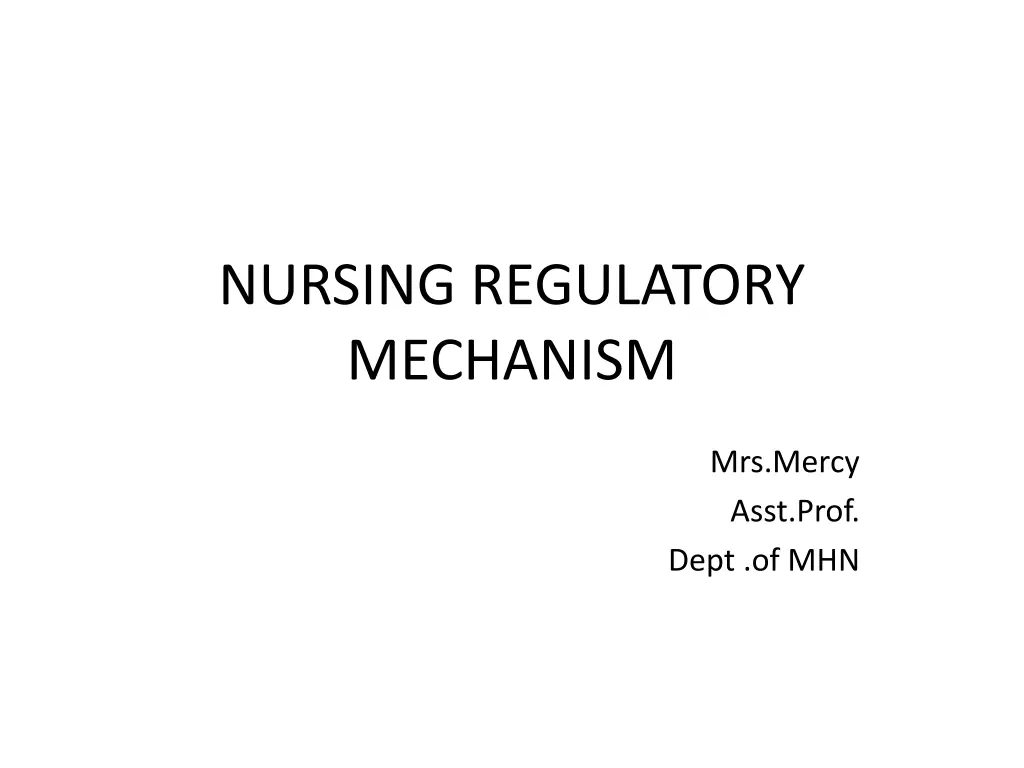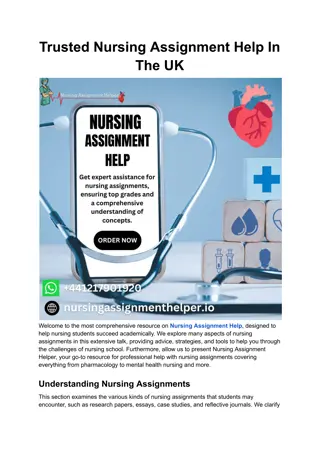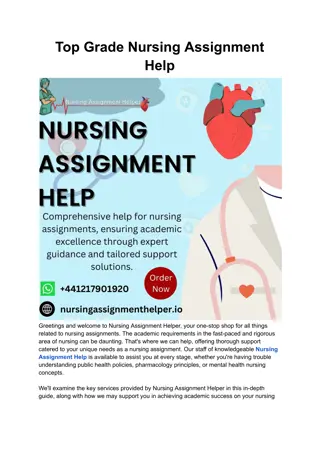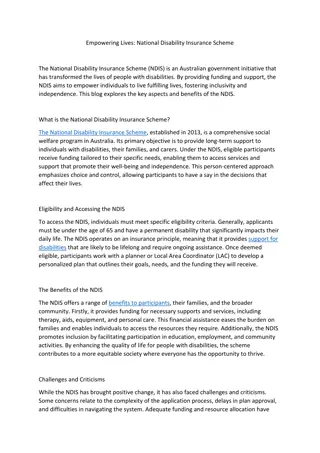
Nursing Regulatory Mechanisms: Understanding the Importance and Role
Explore the significance of regulatory bodies in nursing, their goals, functions, and the role they play in setting and enforcing standards for quality patient care and professional practice. Learn about the key aspects of nursing regulation including defining scope of practice, establishing educational standards, and ensuring accountability.
Download Presentation

Please find below an Image/Link to download the presentation.
The content on the website is provided AS IS for your information and personal use only. It may not be sold, licensed, or shared on other websites without obtaining consent from the author. If you encounter any issues during the download, it is possible that the publisher has removed the file from their server.
You are allowed to download the files provided on this website for personal or commercial use, subject to the condition that they are used lawfully. All files are the property of their respective owners.
The content on the website is provided AS IS for your information and personal use only. It may not be sold, licensed, or shared on other websites without obtaining consent from the author.
E N D
Presentation Transcript
NURSING REGULATORY MECHANISM Mrs.Mercy Asst.Prof. Dept .of MHN
INTRODUCTION Regulation is "controlling human or societal behavior by rules or restrictions."forms of ReguIation : IegaI reguIation: promulgated by a government authority seIf-reguIation : by an industry, institution such as through a trade association, social regulation e.g. norms
REGULATION Regulation refers to the processes used to designate that an individual, programme, institution or product have met established standards set by an agent (governmental or non-governmental) recognised as qualified to carry out this task.- Styles & Affara, 1997,
GOALS OF REGULATION Define the profession and its members Determine the scope of practice Set standards of education Set standards of ethical and competent practice Establish systems of accountability Establish credentialing processes
REGULATORY BODY : Public authority or Government agency DEFINITION Regulatory body is the formal organization designated by a statute or an authorized governmental agency to implement the regulatory forms and process whereby order, consistency and control are brought to the profession and its practice. - ICN,1997
IMPORTANCE OF REGULATORY BODIES To provide quality health care service to the public. To support and assist professional members. Set and enforce standards of nursing practice. Monitor and enforce standards for nursing education. Set the requirements for registration of nursing professionals. To exercise legal control over institution within their respective area.
NURSING REGULATORY MECHANISMS Main functions To protect patient or society To define the scope of nursing practice To identify the minimum level of nursing care that must be provided to clients The regulatory bodies that define the laws and regulations in nursing practice by the nursing councils at the international, national and state levels International council of nurses Indian nursing council State nursing council
ACCREDITATION Accreditation is the process whereby an organization or agency recognizes a college of university of programme of study as having met certain predetermined qualifications of standards - Selden, 1962
A process of review and approval by which an institution, programme or specific service is granted a time-limited recognition of having met certain established standards beyond those that are minimally acceptable. -ICN Organization or agency recognizes a college or university or a program of study as having met certain predetermined standard voluntary educational programs organization qualifications review by a and of process professional
PURPOSES OF ACCREDITATION For the maintenance of adequate administration requirement. Maintaining a uniform standard for nursing education and nursing service. Stimulation of institutional self-improvement by evaluation and inspection. It safeguards the institution from social education and political pressures. It helps in the registration of nurses.
It guides the school/college of nursing, according to recommendation and criteria. It also services to prepare the competent to serve the public. It prescribes the syllabus. It grants recognition to school and colleges.
FUNCTIONS OF ACCREDITATION It aims to protect the autonomy of various health service programmes. It preserves the quality of nursing education. It protects the public from ill prepared nurses. It protects the institutions unsound and unsafe political pressure. It helps the practitioner for the broad scope of nursing practice.
TYPES OF ACCREDITATION AGENCIES i. National accrediting agency ii. National professional accrediting agency iii. State accrediting bodies
NATIONAL AGENCIES Concerned with appraising the total activities of the institutions of higher learning, and with safe guarding the quality of liberal education, the foundation of professional programs in colleges and universities. Each agency establishes evaluation of institutions in its region it reviews those institutions periodically, and it publishes from time to time a list of those agencies which it has accredited. criteria for the
Central advisory board of education All India council for Elementary education All India council for secondary education University grants commission All India council for technical education National assessment and Accreditation council (NAAC)
NATIONAL PROFESSIONAL ACCREDITING AGENCY Aim to foster research, to improve service to the public and the number of individuals admitted to the profession. Medical Council of India Indian Nursing Council Dental council of India Pharmacy council of India Central council of Indian system of Medicine Indian nursing council, (INC) is the official accrediting agency for all programs of nursing, which include Diploma (GNM), Bsc Nursing (both basic and post basic), Msc N /M.phil (Masters) and PhD (Doctoral programs in Nursing)
INDIAN NURSING COUNCIL AIMS To establish uniform standard of training throughout the state Prohibit training centre, which are inadequate Prohibit practice of nursing by non qualified nurses.
FUNCTIONS AND ROLE OF INC Prescribing Syllabus Inspection NATURE OF INSPECTION BY INC First Inspections Re Inspection Periodic Inspections
STATE ACCREDITING BODIES A state nursing councils, which is called reciprocity, was possible only if uniform standards of nursing education were maintained. Providing the registration to the nurses Maintains a register of names of professional nurses All degree holding nurses also have to get the registration in state council.
LICENSURE/REGISTRATION Licensure is defined as the process by which an agency of state government grant permission to an individual to engage in a given profession upon finding that the applicant has attained the essential degree of competency necessary to perform a unique scope of practice (NCSBN,2004). A document issued by a body charged with the exclusive right to determine eligibility for practice in a specified profession, or field in the profession. It is generally used within a regulatory system that prohibits practice without a license. -ICN
PURPOSE:- Licensure offers protection to the public It ensure minimum competency among professional. It ensures minimum standard among the professionals. It help to prevent malpractice. It helps to regulate the professional conduct. Licensing permits a person to offer special skills and knowledge to the public in a particular jurisdiction when such practice would otherwise be unlawful. A particular jurisdiction or area is covered by the license.
In India all nurses are required to be licensed to work in any part of the country, for that they have to be registered in any of the state nursing council. All over India each state running their own nursing council. Registration councils are functioning in all states of India and they are affiliated to INC.
NURSING LICENSURE The process, sanctioned by the law, of granting exclusive power or privilege to persons meeting established standards, which allows them to engage in a given occupation or profession, and to use a specific title.-ICN
CURRENT LICENSURE ACTIVITIES Nurses are required to apply for licensure in each state in which they practice Nurses will be responsible for following the laws and regulations of those states
COMPONENTS OF NURSING PRACTICE ACTS Two essential components 1. To protecting the health and safety of the public 2. Protection of the title of RN Nursing practice act describes the requirements for licensure Registered nurse, is reserved for those meeting the requirements to practice nursing in the state.
Entry into practice candidates for licensure must submit evidence of graduation as defined by each state. Transcript of course work ,letter from principal has to be submitted . A temporary permit may be available for nurses moving from one state to another . Nurses licensed in one jurisdiction by submitting a letter to the second state board of nursing.
Renewal licensure These regulations define the period : a license is a valid and any additional requirements for renewal of licensure . All nurse are expected to remain competent to practice through various means of continuing education.






















